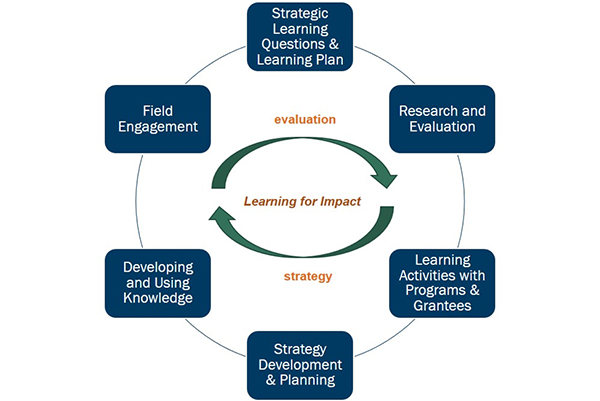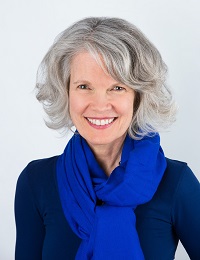Blog Posts | February 20, 2020
Share ThisTransforming Communities and Ourselves: A Year in Review
IMLS Director Dr. Kathryn K. Matthew Reflects on 2019
A new year is a time of celebration, anticipation, and reflection on the past year’s aspirations and accomplishments and that left undone. Like many of you, we at IMLS now look ahead to all that 2020 may have in store.
2019 yielded a diverse range of interactions with our museum and library colleagues, as well as partner agencies and community investors. We spoke with you about our funding opportunities and gleaned feedback through interactive sessions on some of our community-focused tools currently under development. At professional conferences, grant writing workshops, thematic convenings, and the National Book Festival, we interacted with thousands of you. Experiencing firsthand the passion shared by museum and library professionals, their partners, families, students, and their community members was a highlight of the year.
Becoming a Learning Organization
While our focus at IMLS is on the nation’s museums and libraries, never far from our minds are the people that these anchor institutions serve. To be most effective in serving the public, we can’t do our work in isolation. We need to be constantly taking in information, synthesizing it with what we already know, and sharing information back out.
I’ve spoken before about our pledge to fully realize what it means to be a learning organization. To me, and IMLS leadership, part of that is “walking the walk” of what we ask of our grantees: becoming even more analytical, incorporating both new and proven methods in our work, infusing more evaluation into our practice, and sharing more of our knowledge and resources with the museum and library fields. Our reflection has been about taking a hard look at what we’ve accomplished so that we can achieve more in the future, because there’s always room for improvement.
One outcome from our 2018 strategic planning process was clarity about how the agency uniquely accomplishes its work. Consistent approaches over the years have centered around capacity-building, leveraging synergy internally and externally, professional development, dissemination of our work and grantee products, transparency in agency activities, elevating practice (both emerging and proven), and access for all. The final approach—being a learning organization—has been the subject of energetic conversation over the past months and has helped us better understand when we need to step back to learn more before proceeding.
During the December 2019 meeting of the National Museum and Library Services Board, we shared this learning organization framework to help examine the agency’s work—and now, I’ll share the same. We’ve found it helpful as we consider what we don’t know yet, how to build upon the knowledge we already have, and when to seek information from or validate ideas and findings with the fields. There’s no right place to start, though typically, the process might move clockwise through the stages, and sometimes there is a benefit to combining phases simultaneously as the cycle progresses.

The challenge is determining where an early stage idea, such as a pilot or the scaling up of an existing program, may benefit from further information, study, critique, or conversations. Let’s look at some real-life examples.
- Community Catalyst Initiative (CCI): For the past two years, cohorts of grantees have been receiving individual capacity-building support along with cohort-driven learning experiences (“Learning Activities with Grantees”). In addition, an evaluation across all grantees (“Research and Evaluation”) is being conducted. And in the latter half of 2019 “Field Engagement” through regional listening sessions to gauge the usefulness of the initiative’s tools helped to further “Developing and Using Knowledge.” For example, here’s a journey map developed by a grantee.
- Applying Promising Practices for Rural and Small Libraries (APP): The emergent learnings from the CCI approach informed the “Strategic Learning Questions and Learning Plan,” as well as the “Learning Activities with Grantees” and the “Research and Evaluation.” While slightly different from CCI in that grantees selected one of three tracks to build expertise with a mentor organization, the APP cohort learning model is similar. The first cohort learning sessions just occurred last fall, with grantee projects beginning to solidify.
- Scaling up prior work using community resources: The agency has a strong interest in building upon prior work such as projects funded by National Leadership Grants to assess and pilot how to scale up to reach more communities, professional networks, and partners. Two examples illustrate a phased approach of “Strategy Development and Planning” and then “Developing and Using Knowledge”: A cross-sector initiative in partnership with the Boston Children’s Museum, early childhood providers, and BUILD is being tested and assessed more broadly within six states including a third-party evaluation. The Memory Lab at the DC Public Library has grown from a local project to a network of public libraries supporting and inspiring local community archiving and preservation in communities across the country. As you undertake such work, you might hold frequent conversations with sector stakeholders and partner organizations, strengthen networks and coalitions, and establish evaluation questions.
- Retrospective assessments and grants analyses: Within the Office of Museum Services, several program areas will benefit from an increased focus on the “Research and Evaluation” phase in order to answer “Strategic Learning Questions” including the benefits of a prior award to the grantee, barriers to applying, growth trajectories and sustainability indicators of awardee institutions, and resulting products and practices. Stay tuned for more details on these efforts in our upcoming communications.
- Field engagement through workshops and convenings: In addition to the Community Catalyst Listening Sessions, the agency strategically sought qualitative insights from the museum and library sectors through “Field Engagement.” For example, the Tribal Libraries Convening brought together participants from IMLS’s Native American/Native Hawaiian grant program, federal agencies, and State Library Administrative Agencies to learn more about the tribal libraries’ needs and funding opportunities and other support for tribal libraries across the federal government. We gathered library, museum, government, and private stakeholders together at the very first National Tribal Broadband Summit, co-hosted with the US Departments of Interior and Education. We also brought together museum, library, and archival practitioners throughout the nation to share resources and expertise in cross-border digital initiatives. And the Office of Museum Services brought together grantees from the African American History and Culture (AAHC) and Native American/Native Hawaiian Museum Services (NANH) programs to share knowledge and learn from each other.
A New Year, A New Decade
2019 was a year of change and growth for the agency and our sectors. 2020 will bring even more efforts invested in learning and building our collective knowledge base by working with museums and libraries, as well as their partners and communities. We look ahead to setting new agency milestones and measures by which to learn and improve and to reflect upon the past 25 years of our National Medals program through a targeted evaluation and celebratory storytelling. We anticipate exciting applications in response to our grant opportunities, and it is always so inspiring to read about the work museums and libraries have planned with their local communities. We’ll also have some new ways of carrying out our 2018 reauthorization, serving both museum and library professionals to strengthen their capacity to deliver critical services and information.
On behalf of everyone at IMLS, I offer my thanks to the innovation and resiliency evidenced by museums and libraries within communities large and small and across professional interests. I imagine many have set resolutions for the coming 12 months, taking the occasion to think afresh, with new goals and visions for a fulfilling year—or even for the next decade. As the agency heads into 2020, we carry with us our vision: that all members of the public have access to welcoming community spaces, and essential resources and services to help them to thrive.
While my director’s term-limited appointment is drawing to a close, I am confident that IMLS staff will continue to support the public’s needs, aspirations, and interests by advancing the incredible work of museums and libraries across the nation.

About the Author
Dr. Kathryn K. Matthew was confirmed by the Senate in September 2015 as the 5th director of the Institute of Museum and Library Services.
